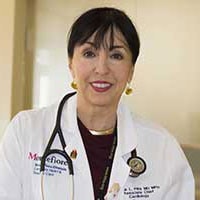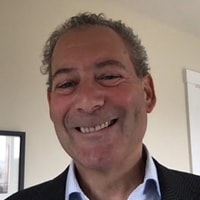This transcript has been edited for clarity.
Ileana L. Piña, MD, MPH: Hello. I'm Ileana Piña from Thomas Jefferson University in Philadelphia. I'm the quality chief. This is my blog today from the European Society of Cardiology (ESC) Congress in Barcelona. It's been an incredibly exciting meeting. Everyone is so happy to be together again in person, and you can really feel the energy in the rooms.
Giving to that energy has been the awaited presentation of DELIVER, the dapagliflozin in preserved function study. I've got Scott Solomon here, who is the primary investigator (PI) of the trial. Welcome. Scott is from the Brigham and Women's Hospital, and he's been working very hard.
Give us the overall view of the trial from your standpoint.
Scott D. Solomon, MD: I'm very excited, first of all, to have a chance to talk to you about this, Ileana. DELIVER, as you know, is the largest and most inclusive trial in heart failure with mildly reduced and preserved ejection fraction.
Piña: Both.
Solomon: Both. We enrolled patients with an ejection fraction above 40%, and we also included patients who had heart failure with improved ejection fraction, which is a group that had never really been studied before.
Piña: A very understudied group.
Solomon: These are people who had EFs that had been below 40% but had risen to above that value at the time of enrollment.
Piña: Which is a substantial number of patients.
Solomon: It was 18%.
Piña: In the clinic, we reverse probably 35% of our patients.
Solomon: It's true, since we've gotten so much better with evidence-based therapies.
Piña: Then we say, "What do we do next?" You're going to tell me what to do next. Tell me about the results.
Solomon: DELIVER overall showed an 18% reduction in the primary endpoint of cardiovascular death or worsening heart failure. Worsening heart failure consisted of heart failure, hospitalization, or an urgent heart failure visit.
What was really remarkable about DELIVER was that we saw that benefit consistently across the spectrum of ejection fraction. The patients with a left ventricular ejection fraction (LVEF) over 60% had the same benefit as those with an LVEF below that value. That was important, because we had seen this attenuation in benefit with other studies in other trials.
Piña: Your other trial, PARAGON-HF.
Solomon: We saw it in PARAGON-HF. We saw it in TOPCAT; we saw it in CHARM-Preserved; and there was a hint of it in EMPEROR-Preserved, presented at this meeting a year ago. Now, we think, based on the DELIVER results, that that was probably play of chance in EMPEROR-Preserved and that there is consistency across the spectrum.
In addition, we saw benefit in every single one of our prespecified subgroups, including patients who were recently hospitalized or in hospital, another group that had been excluded from EMPEROR-Preserved and some of the earlier trials.
Piña: Is that what you call the worsening heart failure group?
Solomon: That is a group that is sort of the subacute population, those patients who are either hospitalized or within 30 days of a hospitalization. In the improved group, we also saw benefit that was similar to that in patients who had consistently greater than 40% ejection fraction.
Piña: Do you have repeated echocardiography in that improved group?
Solomon: We have no echocardiography in DELIVER. Patients were enrolled based on clinical parameters. We didn't actually obtain any echocardiograms in the trial.
Piña: You didn't see any worsening or going back into whatever it was that they were before?
Solomon: We didn't measure these things, so we don't necessarily know, but the outcomes in those patients were really remarkably good.
Piña: The message to the clinicians who are watching us, what do you want to tell them?
Solomon: I think that we now have a therapy that pretty definitively works across the spectrum of heart failure and irrespective of care setting. It's been remarkable, as you know, sodium-glucose co-transporter 2 (SGLT2) inhibitors — drugs that were originally designed for diabetes — now showing this kind of incredible benefit in heart failure with reduced ejection fraction, heart failure with mildly reduced ejection fraction, and heart failure with preserved ejection fraction (HFpEF). Our pooled analysis of DAPA-HF and DELIVER shows that the hazard ratio is essentially flat...
Piña: Consistent.
Solomon: ...across that widespread group.
Piña: What's this drug doing to the HFpEF patients?
Solomon: That's a great question.
Piña: What's the mechanism of action?
Solomon: We really don't know. Do we really know the mechanism of action of all the drugs that we have used for years in heart failure?
Piña: At least we thought we knew them before we studied them. This has happened kind of in reverse.
Solomon: We thought we knew. Obviously, there are many different effects. There have been a number that have been postulated. There is a diuretic effect, although we think that's very mild. There may be a shift in the myocardial energetics that has been proposed. The bottom line is that we really don't know.
Piña: Whatever happens occurs awfully fast. Those curves split apart within 6 months — we haven't seen that. We haven't seen that kind of split.
Solomon: Not only do they split apart within 6 months, but they split apart way earlier than that. We're going to share some data at the Heart Failure Society of America meeting about how fast we actually do see a benefit. I can just say it's rapid.
Piña: Do you have the application in at the US Food and Drug Administration (FDA) already for the indication for preserved EF so you can get the coverage?
Solomon: The FDA will review these data. Absolutely.
Piña: It'll probably be sooner rather than later because of the consistency with the findings for empagliflozin in in EMPEROR-Preserved. It's exciting. We need to redraw the slides that we always used for HFpEF. Make sure the blood pressure is controlled, make sure you check for coronary disease, and stick right in the middle there, to prescribe SGLT2 inhibitors, and then work on all the other comorbidities, which is going to be interesting to see what happens in this trial to the comorbidities that we see in this population.
Solomon: It's very interesting. In addition to our primary manuscript, we actually published quite a few papers.
Piña: I heard.
Solomon: Including one about frailty and one about the effect on older people. We showed consistent results regardless of how frail a patient was or their age. Even the oldest, frailest patients seemed to benefit. Most importantly, the safety, which was basically very similar to placebo overall, was also the case in even the most vulnerable patients that we have.
Piña: Wow. Thank you for coming. I know it's been a very busy meeting for you. We appreciate you coming and chatting with me.
Solomon: It's my great pleasure.
Piña: I'm going to close with this. I want our clinicians to really pay attention to this because you need to think about this drug, and you need to think about it early. That doesn't mean you're not going to treat the blood pressure or treat the diabetes, but you've got to get your patients on this drug.
Now you've heard that, for even the very old and the frail patients — which many of these patients are, particularly the women — you can't withhold the drug. There's absolutely no reason. There's no safety issue here. It's a pretty comfortable drug. I've been using it in clinic, and I'm quite happy with how well it goes and how little the side effect profile is.
Thanks again.
Thank you for joining me from the ESC. I hope you have a wonderful day. Ileana Piña, signing off.
Ileana L. Piña, MD, MPH, is a heart failure and cardiac transplantation expert. She serves as an advisor/consultant to the FDA's Center for Devices and Radiological Health and has been a volunteer for the American Heart Association since 1982. Originally from Havana, Cuba, she is passionate about enrolling more women and minorities in clinical trials. She also enjoys cooking and taking spin classes.
Follow theheart.org | Medscape Cardiology on Twitter
Follow Medscape on Facebook, Twitter, Instagram, and YouTube
© 2022 WebMD, LLC
Any views expressed above are the author's own and do not necessarily reflect the views of WebMD or Medscape.
Cite this: Ileana L. Piña, Scott D. Solomon. DELIVERing the Details on Dapagliflozin in Heart Failure - Medscape - Sep 02, 2022.












Comments